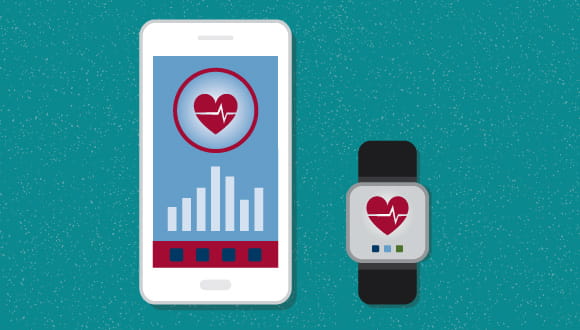Can a Fitness Tracker Help Improve Your Heart Health?
June 23, 2023 - Katie McCallumWith heart disease being the leading cause of death for women, men and individuals of most racial and ethnic groups, taking steps to promote a healthy heart is important for everyone.
But, when it comes to protecting your heart health, you might be looking for a bit of help — possibly even to that fitness tracker wrapped around your wrist.
Let's get one huge disclaimer out of the way right off the bat: A fitness tracker isn't a medical device, and there's no evidence that wearing one reduces a person's risk of developing heart disease.
That being said, we all know that today's fitness trackers come with a slew of features aimed at helping us build and maintain a healthy lifestyle.
Some of these features may help promote heart-healthy behaviors, such as:
- Staying active
- Getting enough sleep
- Managing stress
On the flip side, it's important to recognize that there are other important heart-healthy behaviors a fitness tracker can't help much with yet — like adopting and maintaining a heart-healthy diet.
How a fitness tracker can be used to promote good heart health
Here are three ways a fitness tracker may help you get and stay heart-healthy, as well as two fitness tracker features you should probably avoid taking to heart.
1. Tracking your activity may encourage you to be more active
Not only is physical activity itself good for your heart, it can also help you avoid other common health issues that are risk factors for heart disease, including:
- High blood pressure
- High cholesterol
- Being overweight
- Diabetes
“Activity can also help reduce stress and poor sleep, two everyday issues that can contribute to the heart disease risk factors above,” says Dr. Dr. Bindu Chebrolu, a cardiologist at Houston Methodist.
How do you know if you're being active enough? That's where a fitness tracker may offer some help.
Today’s fitness trackers show you a panel of measurements that can help you understand how active you are — number of steps you've taken, miles you've logged, stairs you've climbed, hours of the day you've done something other than sit — but most also allow you to set an activity goal that's realistic for you. Many even alert you if it seems like you're not on track to hit your daily activity goal.
“It’s still up to you to improve your health, but these measurements, personalized goals and reminders may help you prioritize physical activity,” adds Dr. Chebrolu. “This, in turn, can help you lose excess weight, lower your cholesterol, manage high blood pressure, reduce stress and poor sleep, and lower your risk of diabetes — all of which benefits your heart.”
2. Monitoring your sleep can help you understand if you're getting enough of it
“Poor sleep isn't a direct cause of heart disease, but it can contribute to the development of several heart disease risk factors, namely high blood pressure, obesity and diabetes,” explains Dr. Chebrolu.
Are you getting enough sleep? On average, adults should aim to get seven to eight hours of sleep every night — and, if your fitness tracker also monitors your sleep, it can help you understand how consistent you are at meeting this goal.
However, beware: A fitness tracker isn't an accurate enough to diagnose the quality of your sleep and whether it's poor.
What these trackers are fairly reliable at measuring is whether you're getting enough hours of sleep each night — which is one of the most common contributors to overall poor sleep.
Start by wearing your tracker while you sleep and regularly taking a look at how many hours of sleep you're getting per night. If it's consistently less than seven hours, it's time to assess your sleep habits and correct them as needed — for the sake of your heart health.
3. Breathing reminders and meeting exercise goals can help you reduce stress
“Like poor sleep, chronic stress can be an indirect risk factor for heart disease,” says Dr. Chebrolu. “Finding ways to reduce stress is beneficial for heart health.”
Fortunately, things you might already be doing here and there, such as meditation and/or exercise, can help reduce stress — and a fitness tracker may encourage you to more consistently make time for these healthy, stress-reducing behaviors.
For instance, some popular brands offer you the choice to be reminded about and guided through short breathing exercises a few times throughout the day. Because deep-breathing exercises are one of many techniques that can help promote relaxation, consistently engaging in them can be a way to help reduce your overall stress.
User beware: Don't place too much emphasis on all of your tracker's metrics
Your resting heart rate can help provide clues about your overall heart health.
“A heart rate too high is called tachycardia, which places you at an increased risk of heart disease,” explains Dr. Chebrolu. “A heart rate too low is called bradycardia, which can result in reduced oxygen flow to vital organs.”
Most fitness trackers offer insights into your heart rate, but just know that these devices shouldn't be relied upon to diagnose and/or manage an irregular heart rate. Certain smartwatches, however, may be helpful in screening for and monitoring atrial fibrillation (AFib), one of the most common types of arrhythmia. Talk to your doctor if you notice irregular heart rate patterns on your smartwatch.
Additionally, many fitness trackers attempt to help you understand how many calories you burn throughout the day — particularly during exercise. Just know that these measurements aren't accurate, especially when calculated during moderate-to-strenuous exercise.
Avoid relying on your fitness tracker's calorie counts to determine how many calories you can take in per day. Instead, consult with your doctor or a licensed dietitian about your weight-loss plan.








